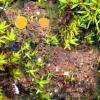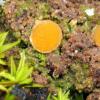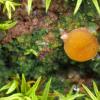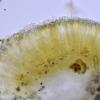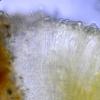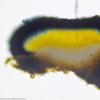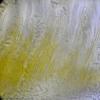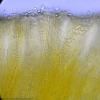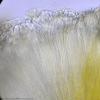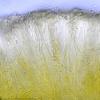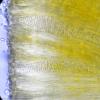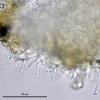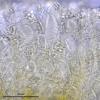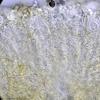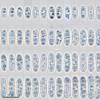
16-02-2026 21:25
 Andreas Millinger
Andreas Millinger
Good evening,failed to find an idea for this fungu

08-12-2025 17:37
 Lothar Krieglsteiner
Lothar Krieglsteiner
20.6.25, on branch of Abies infected and thickened

17-02-2026 17:26
 Nicolas Suberbielle
Nicolas Suberbielle
Bonjour û tous,ô Je recherche cette publication :

15-02-2026 04:32
One more specimen that is giving me some descent a

17-02-2026 13:41
Isabelle CharissouBonjour, est-ce que quelqu'un pourrait me fournir

16-02-2026 18:34
 Thierry Blondelle
Thierry Blondelle
Bonjour,La micro de cet anamorphe de Hercospora su

16-02-2026 17:14
Joanne TaylorLast week we published the following paper where w

16-02-2026 16:53
Isabelle CharissouBonjour, quelqu'un pourrait-il me transmettre un
 Good afternoon
Good afternoon
Looking for Octospores / Lamprospores I found this on the island of Mallorca, among mosses. It turned out to be a lichen and someone suggested that it could be Sarcosagium campestre. With the little information I can find on the net microscopically it could fit with this species, but I see that nobody talks about the hairs on the margin, more than evident even macroscopically in my collection.ô Also macroscopically on the net I see a lot of diversity under the name S. campestre.
Claviform to fusiform asci with numerous ascospores inside, with a very intense bluish reaction to Melzer. Paraphyses multiseptate, strangulated at the septa and with thickened apical cell. Margin with textura angularis. Ascospores cylindrical, usually with 2 large LBs, very variable in size, (6.3) 7.4 - 11.7 (14.2) û (3.2) 3.3 - 3.8 (4.1) ôçm; Q = (1.8) 2 - 3.4 (4); N = 83;ô Me = 9.8 û 3.6 ôçm; Qe = 2.8.
Thank you very much for your help.
Miguel ûngel Ribes



Apos size are 800-1000 microns.
One more unidentified.

